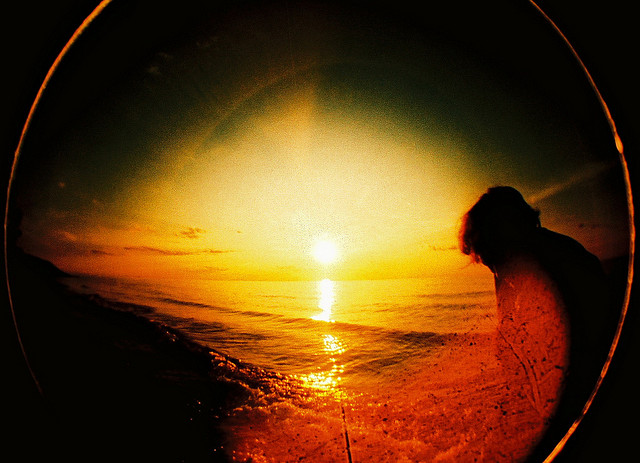Our lizard brain is fear-driven.
It knows there’s something terrible waiting around the corner–ready to f*ck up our day (or life). So, we program ourselves to become extra cautious and avoid anything that could potentially ruin our lives.
We no longer experience adventure.
We experience pain. Regret. Sadness. Self-entitlement. Rage. Boredom. Misunderstandings. Ownership. Safety. Envy. Self-loathing. Divorce.
Rare is the full-grown adult who experiences risks willingly. Curiosity. Deep, meaningful conversation. Bliss. Appreciation. Genuine interest in another being. Compassion for oneself and others. Enlightenment.
Most self-help gurus these days will immediately recommend meditation to cure this fear-driven lizard brain condition.
I’m all for quieting the mind for a little while.
But what I think is more important is understanding why our lives suck and why our attitudes and thinking is creating misery (and we kinda like it).
As an introvert, I’ve always been fascinated by my own thoughts and behaviors.
Unfortunately, I always blamed my personal conduct on circumstances and people. I rarely took any responsibility for my outburst reactions of frustration.
It was always the fault of a family member who was too stupid to understand, or a partner who should have known me better by now, or a boss who under-appreciated my work, or a friend who showed up an hour late, or the neighbor who’s always too loud, or the slow driver in front of me.
They’re the ones with the problem, right? They caused me to feel the way I did and the actions I took.
Wrong. So wrong.
Just reading that we can recognize that it’s wrong (I hope). But that’s what we do when things aren’t going our way. Many of us cast blame and throw shade on another person or circumstance immediately.
A small part of us enjoys being a victim for a little while.
Taking on the victim role feeds our ego. We’re right—they’re wrong. I don’t have to take responsibility for any of this crap. Not. My. Fault.
Unfortunately, that doesn’t translate into that blissful, adventurous life we secretly crave.
Instead, we create uncertainty and adventure in our lives through well-planned out, external means. You know, vacations.
But when vacation time comes, we get bent out of shape when we have to rush to catch a flight to our exotic resort, people are rude to us, we eat foreign foods that disagree with our bodies, and we haven’t pooped in days.
At this point, the only way to enjoy our “adventurous” vacation is to lie in our king-size hotel bed getting wasted on tropical drinks. We’d love to hang out at the beach, but some little brat might kick sand in our drink while we’re trying to get a tan. That would ruin the whole damn experience. Some parents just need to control their children better.
Right?
Maybe you’re reading this and thinking, “Jeez, this is the grumpiest asshole ever. Most people don’t act like this.”
Think again.
You’ve probably behaved this way in the last week at least a few times (or at least thought about it).
This was my natural default for the majority of my life. I thought if I was going to be truly happy, everything had to be controlled and perfect and go exactly according to my plans. Otherwise, I was going to be one pissed-off b*tch.
Here’s what I know to be true (after years of working on my hateful a**), life is going to have a lot of sucky moments and blaming others only makes it worse.
Instead of reacting immediately from that place of fear, and trying to control the situation, or throw our hands in the air and get angry, there’s something else we can do.
See the value in mishaps, imperfections, and proverbial shit storms.
There’s only one thing we need to do. One.
Ask: “How can I make this an adventure?”
I know, you’re laughing hysterically at this question already. Maybe you’re even ROFLMAO at the stupidity of such a thought.
That attitude has to change. You don’t know it all. Neither do I, but at least I am willing to question things now.
External sources aren’t creating the happiness for us. They’re also not creating our misery. It’s our attitude.
By asking the question, “How can I make this an adventure?” we recognize things aren’t going to plan. That’s really what an adventure is. Adventures are messy and sometimes traumatic. But many have happy endings.
The next step our brain may likely take after asking this question is to search for the value in the situation. It may try to find a way to make it fun or at least something to be learned from.
We’re probably still going to default to anger and frustration at first, but we’ll calm ourselves down more quickly and maybe even start to enjoy the experience when we ask the question and find the meaning in the experience.
Over the last few years of implementing this technique, it’s helped me be more at peace with lowering my self-imposed high standards and be more compassionate with others who react out of fear.
The moral of the story?
We wouldn’t need to travel to far lands in search of adventure if we learned to change our attitude and see the adventure in everyday experiences that present challenges for us.
Shift your attitude, improve your life.
Author: Naomi Teeter
Assistant Editor: Brook Bentley / Editor: Catherine Monkman
Photo: Flickr/KevinDooley



Read 1 comment and reply